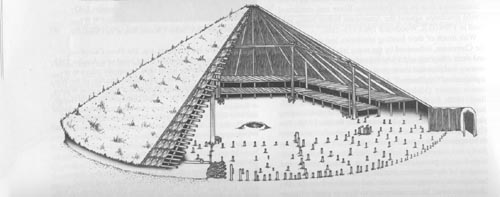|
The Council
House forms the center of community life for the Cherokee. Because
it is oval in construction, its very design encourages discussion.
Historical accounts of council houses state that some were over
18 meters in size and could hold 4-500 people. The Council House
was used both for ceremony and for political discussion.
There is evidence
that the writiers of the Constitution were soimpressed by the democratic
nature of Native Peoples government, that they adopted many aspects
into their vision for the new Colonial government, rejecting many
of the political institutions so prevalent in Europe.
| We
can not know what was said in these early Council Houses,
but we can surmise from the lack of a throne, or a linear
arrangement of
seats as in an auditorium, that participation was more egalitarian
than hierarchial. There is some hierarchy though as there
were leaders
and we know that respect for elders is an vital part of the
Cherokee lifestyle even today and it is likely it was then.
In the section of this
on politics there is a discussion of the dual nature of the
political organization, with a White (or peace organization)
being in charge
during times of peace, but a Red (or war organization) being
in charge during times of strife. |

|
Based on the
large number of people who could fit into the Council
House we can assume that many voices were listened to in Council.
We know from early historical accounts that great importance was
given to everyone's voice and that the value of your words was based
on your wisdom and your ability to deliver your speech. Councils
could meet for days, weeks and even months in orther to form a concensus.
Activity:
Sit in a circle with no one in charge, except perhaps to ask the
questions. Discuss a question based on your reading of the text,
a question which is not one of fact and does not have a yes or no
answer. See if your group can have a "council" where every
voice is heard and all
speakers are treated with respect.
Below is a reconstructed
view of an excavated council house.

|

